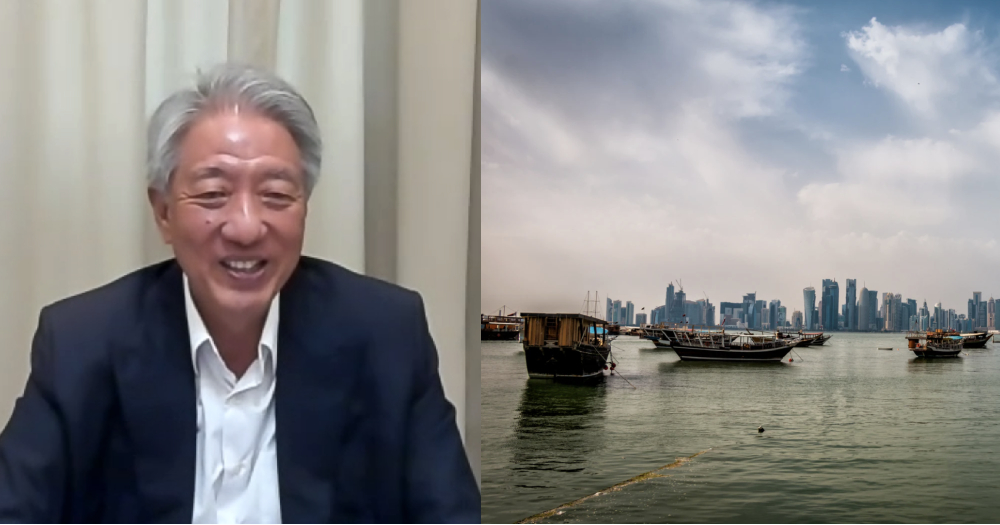Singapore and countries in the Middle East have learnt from each other on how to deal with crisis, Senior Minister Teo Chee Hean said on Wednesday, Feb. 24.
Food resilience
Responding to queries from the audience after giving his address at the annual Middle East Institute (MEI) conference, Teo said Singapore has learnt from Middle Eastern countries on how to respond to crisis in food, such as interruptions in food supply, and how to build resilience in that regard.
The Coordinating Minister for National Security said in the course of his career, he had exchanged ideas on this issue with representatives from the Middle East when he received delegates from the region, and when he visited a number of countries there as well, like those in the Gulf Cooperation Council.
Violent extremism
In addition, Teo said Singapore has learnt from the Middle East on how to deal with "violent extremism".
Having visited a number of rehabilitation centres in the Gulf region, Teo said this enabled them to learn from their experiences and to bring these lessons home.
Teo also pointed out that Singapore has participated actively in the Aqaba Process convened by Jordan's King Abdullah II.
The Aqaba Process is a multinational meeting to strengthen cooperation against terrorism and extremism.
Singapore has hosted similar events as well, having successfully held the International Conference on Cohesive Societies, Teo added.
He said the inter-faith forum -- mooted by Singapore President Halimah Yacob in 2018 -- was "a very useful experience to see how different countries with different cultural and religious context build social cohesion within [their] own societies".
These actions help with the building of domestic resilience and capability to deal with crisis on the national level, which is one of the ways that both the Asia Pacific and Middle Eastern regions can employ to deal with the challenges they face.
Both regions face similar traditional security threats like terrorism, as well as non-traditional security threats like climate change and public health risks, Teo opined.
Regional groupings work to strengthen peace between countries
To tackle these challenges, the strengthening of regional security and stability through building regional groupings is crucial too.
Stressing the importance of each sub-region in Asia to build "regional peace, stability and cooperation", Teo said this can help build a climate where people can "work together, minimise differences and strengthen regional peace".
Such groupings include the GCC in the Gulf and Asean in Southeast Asia, he said, adding that although conflicts, one kind or another, had ravaged the Southeast Asian region in the first four decades after the Second World War, Asean had managed to keep the peace between countries in the region in the last three to four decades.
And this is "a very important part of the development and growth of Southeast Asian countries, and for the betterment of life of our people", he said.
Singapore has also helped promote regional security and stability by hosting a number of platforms for the exchange of ideas, such as the annual IISS Shangri-La Dialogue, a defence summit where top leaders from the region gather, and the Asia-Middle East Dialogue, which was mooted by Singapore in 2004.
Shaping the world's multilateral system
Lastly, both regions can partner each other to strengthen the international multilateral system, so countries big and small can live in more stable world, Teo said.
Teo raised the example of the Global Governance Group, which was "a response of small and medium countries to the formation of the G20", an international forum that comprises the world's largest economies.
"The small and medium countries decided that we can't let the big countries in the world set the agenda for all of us, and so the Global Governance Group was formed," he said.
Teo pointed out that five out of the 30 countries in the group are from Southeast Asia -- Singapore, Brunei, Malaysia, Vietnam and the Philippines.
The Middle Eastern counterparts of these countries are in the group, including Bahrain, Kuwait, Qatar and the United Arab Emirates.
"By working together, we can help shape the multilateral system as well," he said.
Top image adapted via MEI conference & @proriat_hospitality/Unsplash
If you like what you read, follow us on Facebook, Instagram, Twitter and Telegram to get the latest updates.

